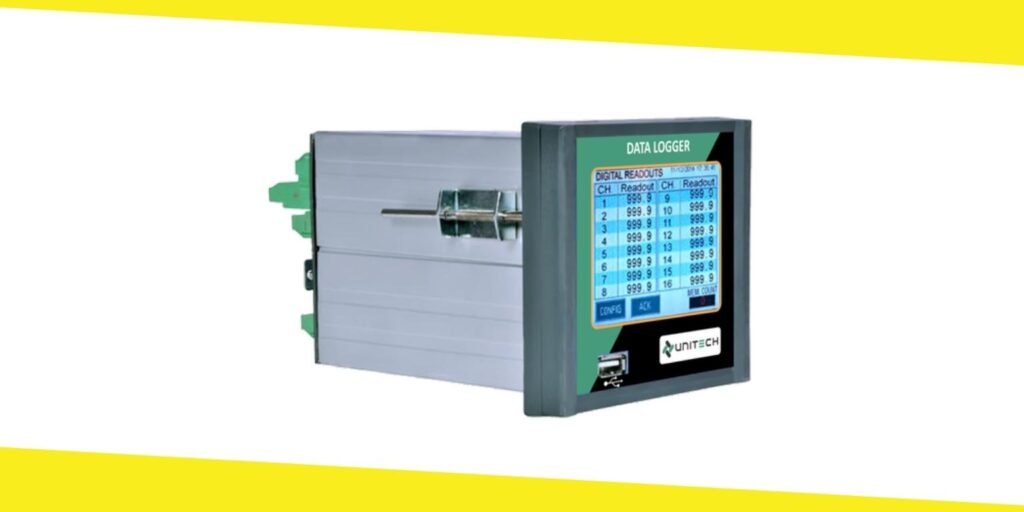Data loggers are pretty amazing tools. Depending on the application, monitor many environmental conditions with ease and fantastic accuracy. In this article, we will look at a data logger, detail the most common types of data loggers, and explain how they work in various settings.
What Is A Data Logger
A data logger is a monitoring device. It can be programmed to measure and record different conditions ranging from temperature and humidity to current and voltage. A data logger can be take these readings at specific intervals. The data it collects can be downloaded and analyzed to identify potential issues. In the case of sensitive assets, data loggers are valuable tools as they assist in confirming compliance and can send alerts when measurement trends show the possibility of the conditions under observation slipping out of compliance.
The average data logger is a portable device with a battery as the primary power source. The small device size, within locations that are either too difficult for humans or in conditions too harsh for humans. Data loggers also contain an internal microprocessor, a storage facility to maintain records for future use, and measuring devices. These measuring items are either internal sensors or external probes, depending on the environmental conditions under surveillance and the location of the data logger.
The Most Common Types Of Data Loggers
There are so many different types of data loggers. However, three varieties are the most common in use today. Bluetooth data loggers, web-based or cloud storage data loggers, and USB data loggers. Here is a closer look at each of these.
A Bluetooth data logger is an electronic measuring device that uses wireless connectivity. They are capable of measuring several different environmental conditions simultaneously and transmitting all or selected data groups to a computer or handheld device. The average Bluetooth data logger range varies but falls within 30 to 50 meters. Bluetooth data loggers commonly contain sensors or probes to track humidity, temperature, voltage, and current, to name a few.
Web-based or Cloud Storage Data Loggers
A data logger that is web-based provides easy, remote access via WiFi. These devices utilize either an on-board web interface or feed measurements to a cloud-based server through the internet. With remote access to the information under observation, there are many ways to use the information. For example, using web-based data for monitoring purposes, analysis, or measurements can trigger an alert system to indicate a trend towards non-compliance.
USB Data Loggers
The most affordable data loggers currently in production today are USB data loggers. That is because these are the smallest and simplest of devices. They are reusable, stand-alone measuring tools built around a USB stick. They utilize either external probes or internal sensors to gather monitoring data. The data that the USB stick contains is easy to collect. The USB stick needs to plug into the USB port of a computer or laptop for download. Some models provide PDF downloads that require no additional hardware to open, read, or save the information stored on the USB stick.
How They Work In Different Settings/Industries
Several different industries rely on the accuracy of data loggers. Here is a closer look at a few of the most common places to find these devices and what they do in these settings.
Supply Chain
Temperature-sensitive assets depend on conditions such as medical supplies, food, and other perishable items. Therefore, this is particularly true as these assets move through shipping, storage, and handling phases of their travel from Point A to Point B. Changes in temperature, even minute variations, can result in spoilage of inventory. Data loggers provide a reliable and accurate means to monitor temperatures at all times in all supply chain stages. They also offer fast alerts should a temperature event occur so that human intervention can remedy the problem.
Storage Facilities
Warehouses, homes, attics, basements, greenhouses, and calibration rooms require careful regulation of humidity levels. For example, locate a data logger built to monitor the relative humidity in temperature-sensitive environments. Multiple data logger models are available with external probes that can measure and track temperature and humidity. When humidity falls out of preset levels, alerts are sent to key personnel to address the situation.
Aerospace
A pressure data logger is commonly used in many different settings but is often associated with measuring of the pressure of gases and liquids in the aerospace industry. Shock data is another measurement these data loggers can monitor and record. Because of the harsh environmental conditions these devices will monitor over time, they have somewhat different construction than all other types of data loggers. A pressure data logger must withstand underwater conditions and other extremes that humans cannot.
Pharmaceutical
Vaccines and various medications require cold storage to remain effective. Data loggers can monitor the extreme cold temperatures used to store vaccines and other drugs before administration. In addition, hospitals rely on data loggers equipped with temperature sensors to keep buildings and medical storage facilities at a constant, cool temperature to ensure all medications remain within their recommended storage temperatures.
Final Thoughts
As you can see, data loggers do much more than just record temperatures. They store data that can be accessed in various methods, depending on the data logger in use. As a result, data loggers are excellent as they provide accurate measurements in unsupervised settings where different environmental conditions count.
Different types of data loggers are best suited for specific applications. It concerns the setting, environmental conditions under observation, and how that data will be stored, retrieved, and analyzed. Data loggers are fantastic little battery-operated devices that keep the supply chain moving smoothly, assist with aerospace development, protect sensitive assets, and much more. Data loggers are vital in maintaining and verifying compliance with regulatory guidelines in several environmental conditions. They do it effortlessly when required.
For More Update Visit TheInspireSpy

